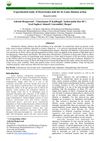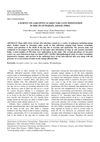 October 2022 in “International journal of Ayurvedic medicine”
October 2022 in “International journal of Ayurvedic medicine” Karaviradya taila reduces hair growth and hair follicles.
March 2021 in “Annals of palliative medicine” Plum-blossom needling with conventional treatments improves hair regrowth in alopecia areata.
 May 2020 in “International journal of current microbiology and applied sciences”
May 2020 in “International journal of current microbiology and applied sciences” A Pug with skin issues was successfully treated for mite and bacterial infections.
 434 citations,
October 2003 in “PTR. Phytotherapy research/Phytotherapy research”
434 citations,
October 2003 in “PTR. Phytotherapy research/Phytotherapy research” Natural products in cosmetics are beneficial for skin and hair care with low toxicity.
1 citations,
April 2022 in “Journal of Ayurveda and integrative medicine” Blumea eriantha DC extract shows strong potential for promoting hair growth.
 17 citations,
April 2021 in “Clinical Phytoscience”
17 citations,
April 2021 in “Clinical Phytoscience” Chitrak is a medicinal plant with health benefits like fighting microbes, reducing inflammation, and promoting hair growth, but it can be toxic and needs more research.
April 2024 in “Cosmetics” Microneedling improves skin and hair conditions by enhancing treatment absorption and stimulating growth factors.
 178 citations,
August 2016 in “Advances in wound care”
178 citations,
August 2016 in “Advances in wound care” New effective scar treatments are urgently needed due to the current options' limited success.
 1 citations,
May 2017 in “InTech eBooks”
1 citations,
May 2017 in “InTech eBooks” Some natural remedies may help with hair regrowth, but more research is needed to confirm their effectiveness and safety.
 October 2023 in “Biomaterials”
October 2023 in “Biomaterials” Nanotechnology could improve hair regrowth but faces challenges like complexity and safety concerns.
 7 citations,
February 2012 in “Facial Plastic Surgery”
7 citations,
February 2012 in “Facial Plastic Surgery” The mini-lift is a less invasive face-lift for younger patients that is quicker, cheaper, and has a fast recovery, but is less effective for the midface and excessive neck skin.
 30 citations,
December 2014 in “Toxicological Research”
30 citations,
December 2014 in “Toxicological Research” Peppermint oil can effectively promote hair growth without being toxic.
January 2023 in “Pharmaceutics” AA–TF#15 significantly promotes hair regrowth and could be an effective treatment for androgenic alopecia.
 April 2024 in “Exploratory Animal and Medical Research”
April 2024 in “Exploratory Animal and Medical Research” Sarcoptes mites cause severe skin issues in dogs, which can be fatal if untreated.
 45 citations,
May 2018 in “Stem Cell Research & Therapy”
45 citations,
May 2018 in “Stem Cell Research & Therapy” Using patients' own fat-derived cells to treat alopecia areata significantly improved hair growth and was safe.
 November 2023 in “Deleted Journal”
November 2023 in “Deleted Journal” Cedrus libani has potential medicinal uses but needs more safety studies.
 15 citations,
January 2019 in “Mediators of inflammation”
15 citations,
January 2019 in “Mediators of inflammation” Aloe vera fermentation helps heal burns faster by reducing inflammation and changing gut bacteria.
 48 citations,
July 2001 in “Clinics in Dermatology”
48 citations,
July 2001 in “Clinics in Dermatology” Cosmetics enhance beauty, fix defects, and intimidate enemies, with varying cultural standards and alternative methods.
 August 2017 in “Indian journal of history of science”
August 2017 in “Indian journal of history of science” The manuscript "Strīvilāsa" offers ancient Ayurvedic knowledge on women's health, beauty treatments, and reproductive care.
 51 citations,
December 2011 in “The Journal of Dermatology”
51 citations,
December 2011 in “The Journal of Dermatology” New treatments for severe hair loss often fail, but some patients see hair regrowth with specific therapies, and treatment should be tailored to the individual's situation.
 10 citations,
May 2020 in “Journal of Dermatological Treatment”
10 citations,
May 2020 in “Journal of Dermatological Treatment” Microneedling with 5% minoxidil improves hair loss in Chinese men by activating Wnt/ß-catenin pathway.
 16 citations,
September 2018 in “Journal of Ethnopharmacology”
16 citations,
September 2018 in “Journal of Ethnopharmacology” Plant-based remedies may treat hair loss by reducing inflammation and improving insulin resistance.
 40 citations,
August 2018 in “Skin appendage disorders”
40 citations,
August 2018 in “Skin appendage disorders” Some alternative treatments for hair loss might work, but more research is needed.
 September 2023 in “Small animal advances”
September 2023 in “Small animal advances” The kitten's skin infection was cured with medication in three weeks.
 January 2020 in “Acta Scientiae Veterinariae”
January 2020 in “Acta Scientiae Veterinariae” A dog's chronic bite wound healed successfully using a mix of herbal gel, low power laser, and ozone therapy.
September 2020 in “Eureka: Health Sciences” The emulgel with specific ingredients was effective for treating hair loss.
 4 citations,
March 2023 in “Current Oncology”
4 citations,
March 2023 in “Current Oncology” Scalp cooling is the only FDA-approved method to prevent hair loss from chemotherapy, but other treatments like minoxidil and PRP are being tested.

Topical treatments like minoxidil and corticosteroids are effective for hair loss, with JAK inhibitors promising for alopecia areata.
 10 citations,
November 2014 in “Journal of Dermatological Treatment”
10 citations,
November 2014 in “Journal of Dermatological Treatment” Polyphenols may help treat skin conditions like warts, hair loss, acne, and dark spots, but more research is needed.
30 citations,
August 2021 in “Journal of Ethnopharmacology” Akebia quinata and Akebia trifoliata have many health benefits and potential medical uses.
























